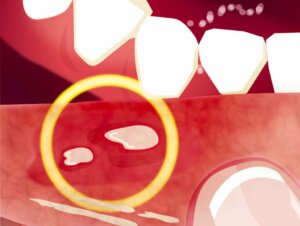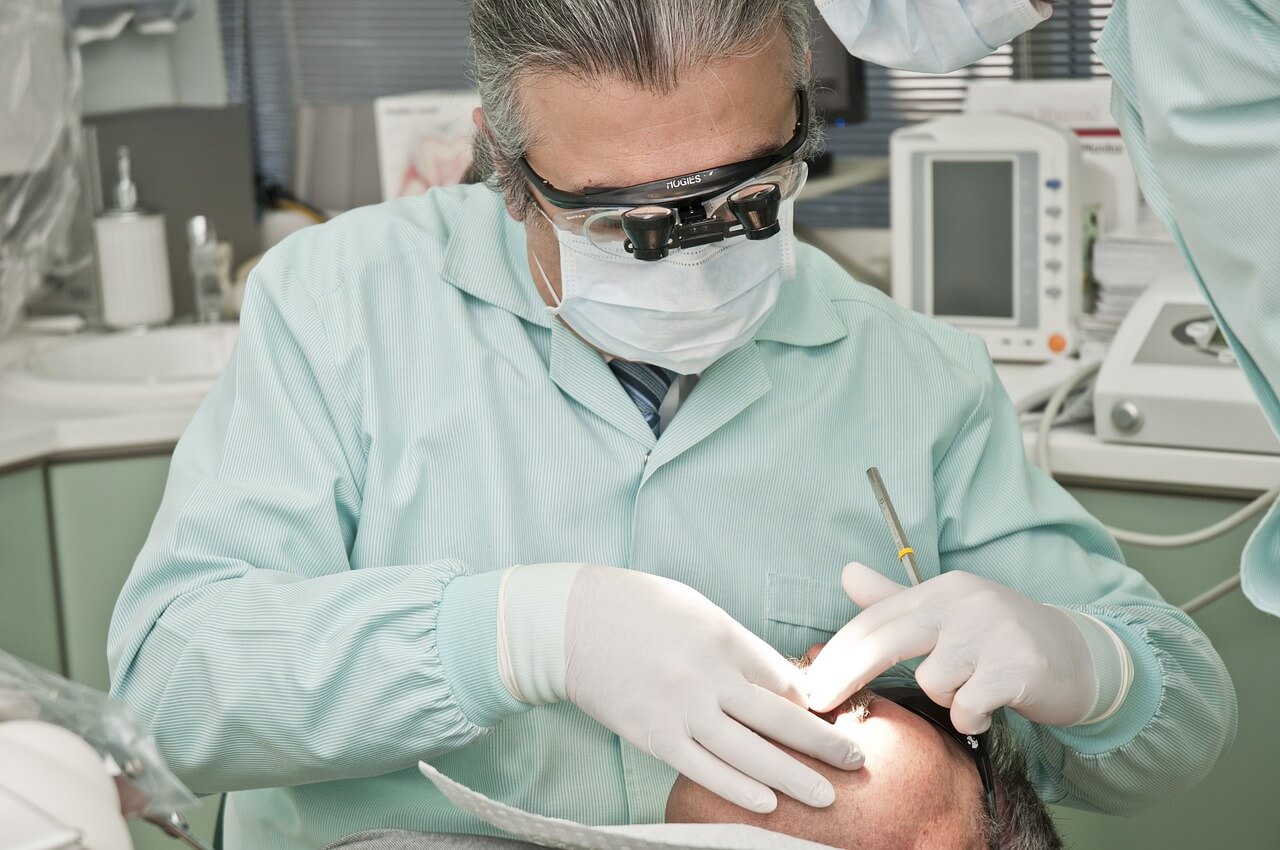Celiac Disease and Oral Health: What's the Link?

Celiac disease is often associated with the development of gastrointestinal problems. Although it’s true that many patients only manifest these types of signs, in reality, this autoimmune disorder is also characterized by symptoms in other parts of the body. Today we explore the relationship between celiac disease and oral health.
Celiac disease and oral health: how are they related?
Given its low population prevalence, and in part due to the uncertainty of the processes that surround the disease, it still isn’t entirely clear what the relationship is between celiac disease and oral health.

The hypotheses suggest that problems during calcium absorption and the immune consequences of the disorder may be the cause, although there’s no general consensus on this among specialists.
Of course, the evidence indicates that oral manifestations may be the only symptom of celiac disease. When this happens, they appear recurrently and in chronic stages. Although it’s true that its prevalence doesn’t have any particular age, complications of this type are more frequent in children.
Experts don’t know the reason for this, although eating behavior, the fact that your body is still in the development stage, and your permanent teeth not having appeared yet may be the causes.
Episodes of this type are so frequent at this age that the Celiac Disease Center at the University of Chicago has a warning manual available for dentists.
Oral complications due to celiac disease
Research has identified several oral manifestations related to celiac disease. As we already indicated, these are more frequent in childhood. However, adults can easily develop them too (especially if they don’t adhere to a gluten-free diet). Some of these complications are:
Aphthous stomatitis
Aphthous stomatitis, also known as canker sores or mouth ulcers, is a recurrent oral manifestation in celiac disease. Although, in general, it’s common in childhood, when it occurs very frequently it can be a sign that the patient is suffering from celiac disease.
Multiple studies and investigations have given evidence for this relationship. Canker sores are characterized by white sores that develop on the gums, tongue, or on the inside of the cheeks or lips. It isn’t at all dangerous for the patient, although it’s usually quite bothersome to speak or eat freely. They usually last one to two weeks.
Enamel defects
Research published in the Pakistan Journal of Medical Sciences in 2015 suggests that up to 48% of young people with celiac disease develop defects in the enamel of their teeth. Although it’s true that this problem is relatively common during childhood, the control group of healthy patients had a prevalence of only 16%.
Therefore, celiacs may be up to three times more likely to have a complication with tooth enamel compared to people without the disorder. Enamel hypoplasia, for example, is one of the most common problems.
Dry mouth
Again we’re faced with a benign symptom, but one that can also be uncomfortable for patients. A November 2018 publication in Oral Medicine, Oral Pathology, Oral Surgery indicates that, along with enamel defects, dry mouth is the most common oral symptom of celiac disease.
This sequela of the disease can occur in isolation or be caused by a developed autoimmune disorder. Specifically, dry mouth is a classic symptom of Sjögren’s syndrome. As we’ve already indicated in other articles on the subject, having celiac disease increases the chances of contracting another autoimmune condition.
Cavities
Although this manifestation isn’t without controversy, there are some indications that cavities are more frequent in celiacs than in healthy patients. Specifically, research published in Human Antibodies in May 2021 found that, in a group of 120 children with dental caries, the prevalence of celiac disease was 11.6%.
These and other similar study results should be interpreted with caution, as cavities are a very common problem during childhood. Even so, celiacs should know that they may be predisposed to suffer from this condition, and vice versa.
Other oral health problems due to celiac disease

The above oral health problems due to celiac disease are the most frequent ones that usually develop. Of course, there are many others that, albeit less common, are still latent in diagnosed patients. Here’s a selection provided by the American Dental Association (ADA) :
- Delayed tooth eruption
- Angular cheilitis
- Discoloration of the teeth
- Atrophic glossitis
- Squamous cell carcinoma of the oropharynx
Regarding the latter, the Celiac Disease Foundation warns that those who don’t adhere to a strict gluten-free diet are more likely to suffer from cancer of the mouth, pharynx, and esophagus. It also warns that those diagnosed should ensure that their dental hygiene products are free of this protein. Namely, toothpastes or rinses.
A lack of the following vitamins and minerals can also cause oral health problems.
- Vitamin B12: Very common in celiacs, a lack of it can cause bone loss around the teeth and hemorrhagic gingivitis.
- Iron: This is related to angular stomatitis, which can also lead to sores and dry lips.
- Vitamin D: A lack can cause enlarged adenoids, which in turn compromise the integrity of the teeth in the alveolar bone.
- Vitamin C: A lack of this vitamin can encourage the irregular formation of dentin, as well as bleeding gums, delayed healing in the mouth, and alterations of the dental pulp.
- Zinc: Its deficiencies can make the tongue lose sensitivity, taste, and increase the chances of suffering from gum disease.
- Vitamin B6: Here you can suffer from a burning in the mouth, on the tongue and periodontal disease.
- Vitamin A: If its levels are very low, enamel hypoplasia and deterioration can occur during the formation of the teeth.
As you can see, there are many ways in which celiac disease can affect your oral health. Fortunately, to reduce the incidence of these complications you only have to do one thing: avoid eating gluten.
If you’re a celiac, then make sure you adhere to a diet of this type. If in doubt, don’t be afraid to consult a nutritionist for advice on the process.
Celiac disease is often associated with the development of gastrointestinal problems. Although it’s true that many patients only manifest these types of signs, in reality, this autoimmune disorder is also characterized by symptoms in other parts of the body. Today we explore the relationship between celiac disease and oral health.
Celiac disease and oral health: how are they related?
Given its low population prevalence, and in part due to the uncertainty of the processes that surround the disease, it still isn’t entirely clear what the relationship is between celiac disease and oral health.

The hypotheses suggest that problems during calcium absorption and the immune consequences of the disorder may be the cause, although there’s no general consensus on this among specialists.
Of course, the evidence indicates that oral manifestations may be the only symptom of celiac disease. When this happens, they appear recurrently and in chronic stages. Although it’s true that its prevalence doesn’t have any particular age, complications of this type are more frequent in children.
Experts don’t know the reason for this, although eating behavior, the fact that your body is still in the development stage, and your permanent teeth not having appeared yet may be the causes.
Episodes of this type are so frequent at this age that the Celiac Disease Center at the University of Chicago has a warning manual available for dentists.
Oral complications due to celiac disease
Research has identified several oral manifestations related to celiac disease. As we already indicated, these are more frequent in childhood. However, adults can easily develop them too (especially if they don’t adhere to a gluten-free diet). Some of these complications are:
Aphthous stomatitis
Aphthous stomatitis, also known as canker sores or mouth ulcers, is a recurrent oral manifestation in celiac disease. Although, in general, it’s common in childhood, when it occurs very frequently it can be a sign that the patient is suffering from celiac disease.
Multiple studies and investigations have given evidence for this relationship. Canker sores are characterized by white sores that develop on the gums, tongue, or on the inside of the cheeks or lips. It isn’t at all dangerous for the patient, although it’s usually quite bothersome to speak or eat freely. They usually last one to two weeks.
Enamel defects
Research published in the Pakistan Journal of Medical Sciences in 2015 suggests that up to 48% of young people with celiac disease develop defects in the enamel of their teeth. Although it’s true that this problem is relatively common during childhood, the control group of healthy patients had a prevalence of only 16%.
Therefore, celiacs may be up to three times more likely to have a complication with tooth enamel compared to people without the disorder. Enamel hypoplasia, for example, is one of the most common problems.
Dry mouth
Again we’re faced with a benign symptom, but one that can also be uncomfortable for patients. A November 2018 publication in Oral Medicine, Oral Pathology, Oral Surgery indicates that, along with enamel defects, dry mouth is the most common oral symptom of celiac disease.
This sequela of the disease can occur in isolation or be caused by a developed autoimmune disorder. Specifically, dry mouth is a classic symptom of Sjögren’s syndrome. As we’ve already indicated in other articles on the subject, having celiac disease increases the chances of contracting another autoimmune condition.
Cavities
Although this manifestation isn’t without controversy, there are some indications that cavities are more frequent in celiacs than in healthy patients. Specifically, research published in Human Antibodies in May 2021 found that, in a group of 120 children with dental caries, the prevalence of celiac disease was 11.6%.
These and other similar study results should be interpreted with caution, as cavities are a very common problem during childhood. Even so, celiacs should know that they may be predisposed to suffer from this condition, and vice versa.
Other oral health problems due to celiac disease

The above oral health problems due to celiac disease are the most frequent ones that usually develop. Of course, there are many others that, albeit less common, are still latent in diagnosed patients. Here’s a selection provided by the American Dental Association (ADA) :
- Delayed tooth eruption
- Angular cheilitis
- Discoloration of the teeth
- Atrophic glossitis
- Squamous cell carcinoma of the oropharynx
Regarding the latter, the Celiac Disease Foundation warns that those who don’t adhere to a strict gluten-free diet are more likely to suffer from cancer of the mouth, pharynx, and esophagus. It also warns that those diagnosed should ensure that their dental hygiene products are free of this protein. Namely, toothpastes or rinses.
A lack of the following vitamins and minerals can also cause oral health problems.
- Vitamin B12: Very common in celiacs, a lack of it can cause bone loss around the teeth and hemorrhagic gingivitis.
- Iron: This is related to angular stomatitis, which can also lead to sores and dry lips.
- Vitamin D: A lack can cause enlarged adenoids, which in turn compromise the integrity of the teeth in the alveolar bone.
- Vitamin C: A lack of this vitamin can encourage the irregular formation of dentin, as well as bleeding gums, delayed healing in the mouth, and alterations of the dental pulp.
- Zinc: Its deficiencies can make the tongue lose sensitivity, taste, and increase the chances of suffering from gum disease.
- Vitamin B6: Here you can suffer from a burning in the mouth, on the tongue and periodontal disease.
- Vitamin A: If its levels are very low, enamel hypoplasia and deterioration can occur during the formation of the teeth.
As you can see, there are many ways in which celiac disease can affect your oral health. Fortunately, to reduce the incidence of these complications you only have to do one thing: avoid eating gluten.
If you’re a celiac, then make sure you adhere to a diet of this type. If in doubt, don’t be afraid to consult a nutritionist for advice on the process.
- Aydemir, S., Tekin, S. N., Aktunç, E., Numanoğlu, G., & Üstündağ, Y. Celiac disease in patients having recurrent aphthous stomatitis. 2004.
- Cantekin K, Arslan D, Delikan E. Presence and distribution of dental enamel defects, recurrent aphthous lesions and dental caries in children with celiac disease. Pak J Med Sci. 2015;31(3):606-9.
- Cruz IT, Fraiz FC, Celli A, Amenabar JM, Assunção LR. Dental and oral manifestations of celiac disease. Med Oral Patol Oral Cir Bucal. 2018 Nov 1;23(6):e639-e645.
- Kalvandi G, Shahramian I, Farmany A, Yadegari S, Parooie F. Serological study of celiac disease in children with dental caries. Hum Antibodies. 2021 May 31.
- Macho VMP, Coelho AS, Veloso E Silva DM, de Andrade DJC. Oral Manifestations in Pediatric Patients with Coeliac Disease – A Review Article. Open Dent J. 2017 Oct 24;11:539-545.
- Rashid M, Zarkadas M, Anca A, Limeback H. Oral manifestations of celiac disease: a clinical guide for dentists. J Can Dent Assoc. 2011;77:b39.
- Sedghizadeh PP, Shuler CF, Allen CM, Beck FM, Kalmar JR. Celiac disease and recurrent aphthous stomatitis: a report and review of the literature. Oral Surg Oral Med Oral Pathol Oral Radiol Endod. 2002 Oct;94(4):474-8.
Este texto se ofrece únicamente con propósitos informativos y no reemplaza la consulta con un profesional. Ante dudas, consulta a tu especialista.







